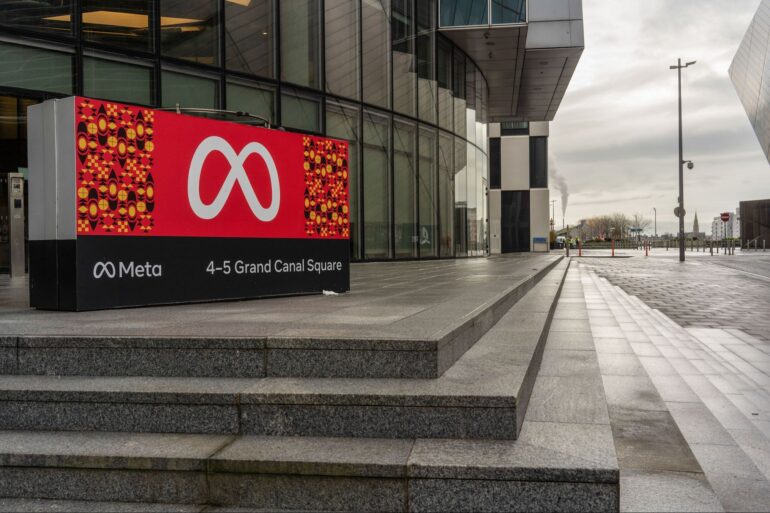TL;DR:
- Meta implements a global ban on using generative AI for political advertising.
- The ban covers sensitive topics and regulated industries like politics, elections, housing, and health.
- This policy applies worldwide, including upcoming elections in several nations.
- Meta plans to integrate generative AI across its platforms and offers AI-powered ad tools.
- AI plays a significant role in content recommendation and ad optimization.
- Meta ensures responsible AI use and collaborates with industry stakeholders.
Main AI News:
In a bold move, Meta has announced a sweeping policy change that will have a significant impact on the landscape of political advertising. The social media giant, whose platforms include Facebook, Instagram, WhatsApp, and Threads, has decided to enforce a worldwide ban on the use of generative artificial intelligence (AI) advertising tools for political campaigns.
This groundbreaking decision means that advertisers will no longer have access to Meta’s generative AI tools within its Ads Manager for creating political ads. The ban extends to a range of sensitive topics and regulated industries, including politics, elections, housing, employment, credit, social issues, health, pharmaceuticals, and financial services.
Meta’s commitment to this policy is resolute and applies globally. Dan Neary, Meta’s Asia-Pacific vice president, emphasized the company’s dedication to understanding and mitigating potential risks associated with using generative AI in ads related to sensitive topics. Neary stated, “This approach will allow us to better understand potential risks and build the right safeguards for the use of generative AI in ads that relate to potentially sensitive topics in regulated industries.”
This policy change comes at a critical time as several nations gear up for elections in the coming year. General elections are expected in countries such as Indonesia and India, while presidential elections are on the horizon in the United States, Finland, Pakistan, and Taiwan.
Meta’s focus on AI technology remains unwavering, as it plans to integrate generative AI capabilities across all its platforms. The Ads Manager tool, often referred to as an “all-in-one tool,” serves as a launchpad for running ads on Meta’s platforms, offering features such as background generation, text variation, and image manipulation. Notably, text variation enables advertisers to create multiple versions of text to engage diverse audiences.
In addition to its advertising endeavors, Meta has introduced an AI chatbot named Meta AI, featuring an AI image generator tool called Emu. These AI-generated images can be used across Meta’s chat platforms, including WhatsApp and Instagram.
Dan Neary also shared insights into the adoption rate of Meta’s AI products, highlighting that more than half of advertisers are utilizing the company’s Advantage+ tools to optimize images and text in their ad campaigns. These tools have contributed to a substantial $10 billion run rate from Advantage+ shopping campaigns, with a notable three-fold increase in weekly usage compared to six months ago. Furthermore, AI plays a pivotal role in content recommendation, with 20% of content on Facebook and Instagram Feeds now being recommended by AI algorithms.
Meta’s commitment to AI extends to enhancing outcomes for marketers. Neary emphasized that AI tools, like the Advantage+ suite, automate various tasks, providing valuable opportunities for businesses to connect with their target audiences. Meta’s vast user base, which includes 3.96 billion monthly users and 3.14 billion daily users, spans the globe, with a significant presence in the Asia-Pacific region.
Regarding data utilization for training generative AI tools, Neary clarified that Meta employs a combination of sources, including publicly available online data, licensed data, and information from Meta’s own products and services. Notably, the company excludes websites that frequently share personal information from its training datasets. Publicly shared content from Instagram and Facebook, such as photos and text, contributes to training the generative AI models that power Meta’s AI features.
In response to growing concerns about AI safety and personal data usage, Meta has established a dedicated cross-disciplinary team tasked with ensuring responsible technology design and use. The company actively seeks feedback from external experts and regulators to uphold ethical standards.
Conclusion:
Meta’s decision to ban AI-powered political ads reflects its commitment to responsible AI use. This move may impact the digital advertising market, particularly in politics and sensitive industries, by fostering a more regulated and ethical advertising landscape. Advertisers will need to adapt to these changes and explore alternative strategies for engaging with their audiences.

